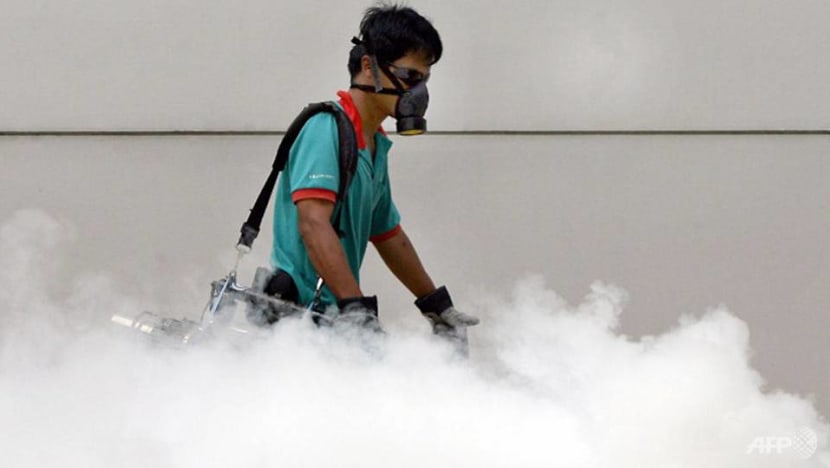Weekly dengue cases fall by 70% as NEA closes almost all clusters since start of 2022

A worker fogs a housing estate in Singapore. (File photo: AFP/Roslan Rahman)
SINGAPORE: The weekly number of dengue cases has dropped by about 70 per cent from its peak in May, and about 95 per cent of dengue clusters since the start of 2022 have been closed.
The National Environment Agency (NEA) announced these figures on Monday (Oct 10), adding that as of last Friday, there have been more than 28,500 dengue cases this year.
There were 427 dengue cases reported last week, 46 fewer from the week before.
As of last Friday, there are 142 dengue clusters - six fewer than the week before. Over the last three weeks, clusters with hundreds of cases - located at Ghim Moh Road, Bedok Reservoir Road and Clementi Road - have also been closed, said NEA.
The agency said it has closed 2,563 out of 2,705 dengue clusters since the start of this year.
But NEA cautioned that it continues to observe active clusters with a "relatively fast rate of transmission", including at Clementi West Street 2, Jurong East Street 21, Jurong West Avenue 5 and Rivervale Crescent.
Related:
In February this year, Singapore experienced early signs of a dengue outbreak with more than 200 weekly cases reported.
In response, the launch of a National Dengue Prevention Campaign was brought forward and new dengue alert banners put up in areas with persistently high Aedes aegypti mosquito population, said NEA in a media release.
The agency also worked with partners like town councils to conduct about 200,000 inspections in the first half of the year, removing about 51,000 potential mosquito breeding habits. This was on top of 409,000 inspections by NEA islandwide in the same period.
Since July, the agency has also released male Wolbachia-Aedes mosquitoes at eight additional field sites, bringing 1,400 more Housing and Development Board (HDB) blocks under Project Wolbachia - and increasing its coverage to about 31 per cent of all HDB blocks in Singapore.
Under this project, male Wolbachia-carrying Aedes aegypti mosquitoes will mate with females, causing them to lay eggs that do not hatch, thus reducing the dengue mosquito population.
"Even though we are moving beyond the traditional dengue peak season, continued vigilance remains critical as weekly dengue cases and the Aedes aegypti mosquito population remain high," said NEA on Monday.
“Weekly dengue cases could continue to remain high beyond the peak dengue season (June to October) as we still see dengue transmission in many areas across the island."
These include large clusters at Boon Lay Avenue, Aroozoo Avenue, Hougang Avenue 1, Jelapang Road, Bishan Street 11 and Marine Crescent, said NEA.
The agency added that it continues to work closely with grassroots advisers and community volunteers, to reach out to residents on dengue prevention efforts.
It also urged people to maintain good housekeeping and take measures to bring down dengue case numbers further - including using insect repellent and doing the necessary to curb the mosquito population, such as by changing water in vases.

















